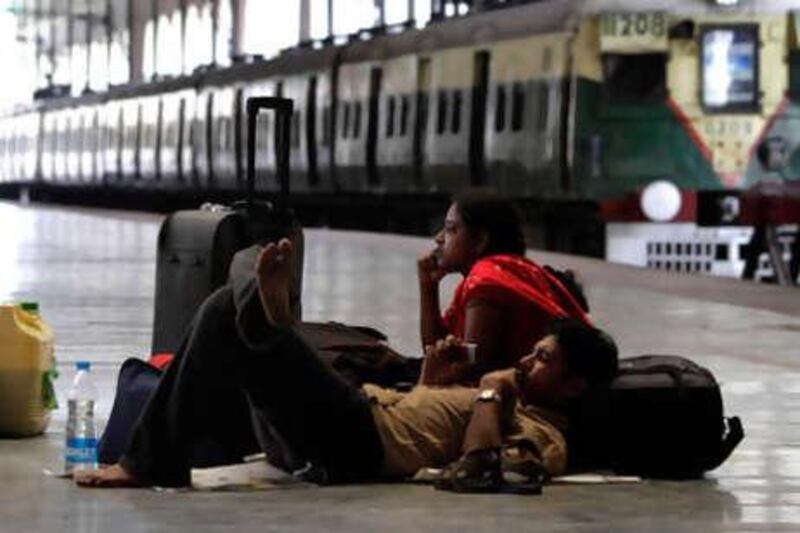NEW DELHI // Transportation ground to a halt and businesses were closed today in many parts of India following a one-day strike by the main opposition parties to protest a government-imposed hike in fuel prices. "Because of the obstruction caused by protesters, train services have been stopped in West Bengal state," said Samir Goswami, a railroad spokesman, in Calcutta, the state's capital. Flights were also halted at Calcutta's airport, which serves domestic and international destinations.
Train and air services were affected in Mumbai, India's financial and entertainment capital, where taxis went off the roads as protesters belonging to the Hindu nationalist Bharatiya Janata Party and Shiv Sena came out on the streets. There was no major violence reported in the country, although there were some minor scuffles between demonstrators and police. Demonstrators and police also clashed in Lucknow in northern Uttar Pradesh, where police detained two Hindu nationalist leaders, Arun Jaitley and Mukhtar Abbas Naqvi, said Surendra Srivastava, a police spokesman.
Worst hit were the states governed by communist groups and the opposition Hindu nationalist Bharatiya Janata Party, which is seen as generally pro-market. Those states included Madhya Pradesh, Gujarat, Karnataka, West Bengal and Kerala states. There were also some minor disturbances in New Delhi, though businesses and schools remained open. The opposition called the daylong protest after the federal government refused to roll back the 6.7 per cent hike in fuel prices announced 10 days ago.
The unpopular hike in fuel prices came as the government struggled to stem losses at state-run oil companies and tame the fiscal deficit while facing double-digit inflation. The government said the hike could save the state US$5.2 billion (Dh19bn) but exacerbate inflation by nearly a percentage point. The government last month decided to deregulate petrol prices, resulting in a 6.7 per cent, or 3.5 rupees (Dh0.2) per litre price increase.
The price of diesel - important for farmers' irrigation pumps and tractors, as well as trains and buses - was increased by 5 per cent, or 2 rupees per litre, but will not be deregulated immediately. The government also raised kerosene prices by 33 per cent, or 3 rupees per litre, the first increase since 2002. But the government continued to subsidise kerosene, which is used for cooking by tens of millions of poor Indians.
Liquefied petroleum gas, also used for cooking, now costs 35 rupees, or 11.2 per cent, more per cylinder. Even after the price hikes, state-run oil and gas companies will face a shortfall of 530 billion rupees from below-cost sales, India's petroleum ministry said. Price controls have bled profits from state oil companies like Oil and Natural Gas Corporation Ltd and Oil India Limited. The government has been forced to spend billions through direct subsidies and off-balance sheet oil bonds to help compensate for those losses.
* AP





